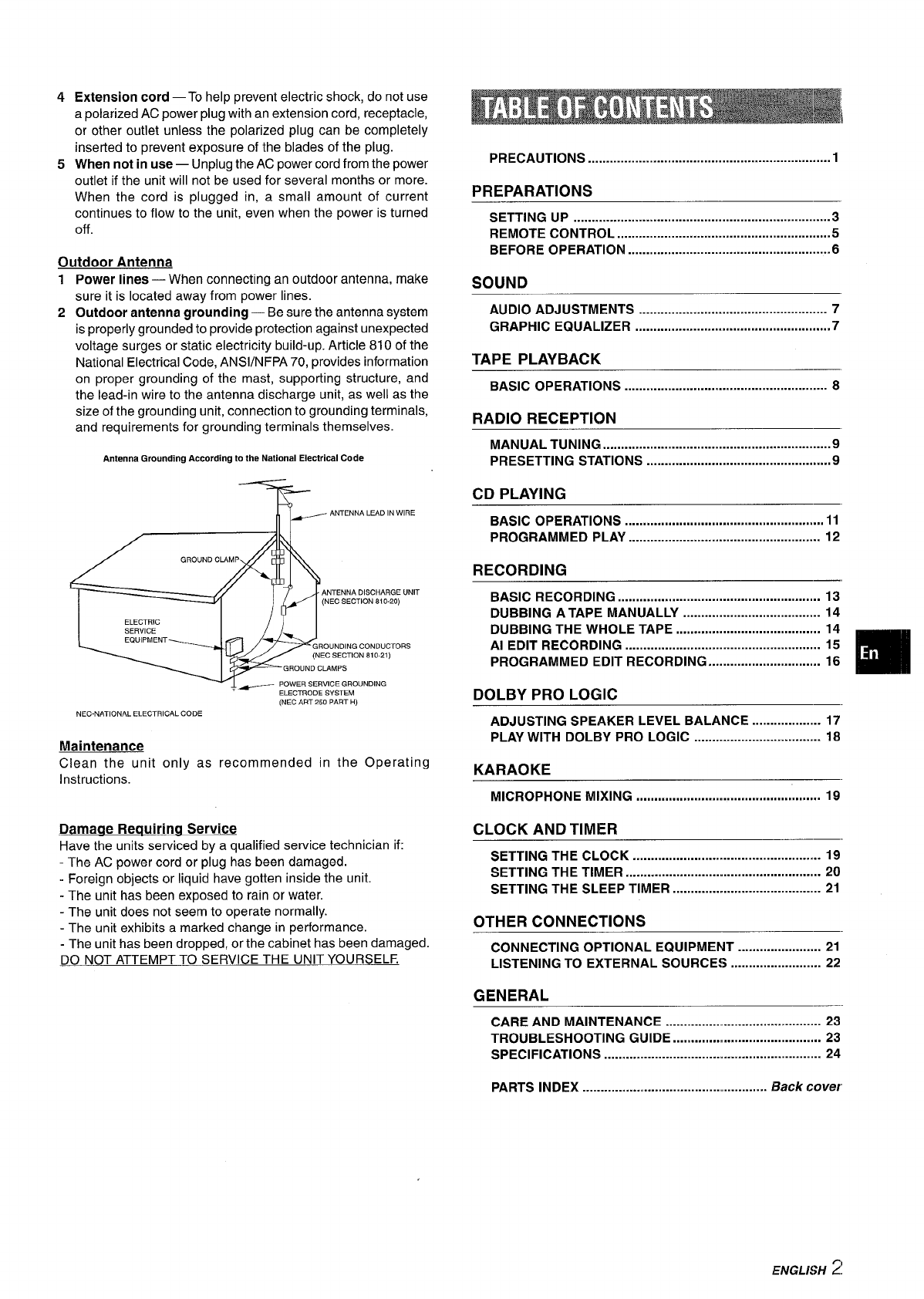
4
5
Extension cord — To help prevent electric shock, do not use
a polarized AC power plug with an extension cord, receptacle,
or other outlet unless the polarized plug can be completely
inserted to prevent exposure of the blades of the plug.
When not in use — Unplug the AC power cord from the power
outlet if the unit will not be used for several months or more.
When the cord is plugged in, a small amount of current
continues to flow to the unit, even when the power is turned
off.
Outdoor Antenna
1
2
Power lines — When connecting an outdoor antenna, make
sure it is located away from power lines.
Outdoor antenna grounding — Be sure the antenna system
is properly grounded to provide protection against unexpected
voltage surges or static electricity build-up. Article 810 of the
National Electrical Code, ANS1/NFPA 70, provides information
on proper grounding of the mast, supporting structure, and
the lead-in wire to the antenna discharge unit, as well as the
size of the grounding unit, connection to grounding terminals,
and requirements for grounding terminals themselves.
Antenna Grounding According to the National Electrical Code
n
~ ANTENNA LEAD IN WIRE
ANTENNA DISCHARGE UNIT
(NEC SECTION s+0-20)
I
ELECTRIC
I /11
-?7
ELECTRODE SYSTEM
(NEC ART 25o PART H)
NEC-NATIONAL ELECTRICAL CODE
Maintenance
Clean the unit only as recommended in the Operating
Instructions.
Damaae Requiring Service
Have the units serviced by a qualified service technician if:
- The AC power cord or plug has been damaged.
- Foreign objects or liquid have gotten inside the unit.
- The unit has been exposed to rain or water.
- The unit does not seem to operate normally.
- The unit exhibits a marked change in performance.
- The unit has been dropped, or the cabinet has been damaged.
DO NOT ATTEMPT TO SERVICE THE UNIT YOURSELF.
I
PRECAUTIONS ...................................................................1
PREPARATIONS
SETTING UP .......................................................................3
REMOTE CONTROL ...........................................s...............5
BEFORE OPERATION ........................................................6
SOUND
AUDIO ADJUSTMENTS .................................................... 7
GRAPHIC EQUALIZER ......................................m..............17
TAPE PLAYBACK
BASIC OPERATIONS ...........m............................................ 8
RADIO RECEPTION
MANuALTuNING ...............................................................9
PRESETTING STATIONS ...................................=..........m...m9
CD PLAYING
BASIC OPERATIONS
......m....m.m.m...mm...m...l.....................m...mll
PROGRAMMED PLAY ..................................................... 12
RECORDING
—,
BASIC RECORDING ........................................................ 13
DUBBING A TAPE MANUALLY ...................................... 14
DUBBING THE WHOLE TAPE ........................................ 14
Al EDIT RECORDING ...................................................... 15
PROGRAMMED EDIT RECORDING ............................... 16
❑
DOLBY PRO LOGIC
ADJUSTING SPEAKER LEVEL BALANCE ...................17
PLAY WITH DOLBY PRO LOGIC ................................... 18
KARAOKE
MICROPHONE MIXING
...................................................
19
CLOCK AND TIMER
SETTING THE CLOCK ..................m................................. 19
SETTING THE TIMER ...................................................... 20
SETTING THE SLEEP TIMER ......................................... 21
OTHER CONNECTIONS
CONNECTING OPTIONAL EQUIPMENT ....................... 21
LISTENING TO EXTERNAL SOURCES m........................ 22
GENERAL
CARE AND MAINTENANCE ............... ......................... 23
TROUBLESHOOTING GUIDE ....m........o........................... 23
SPECIFICATIONS ............................................................ 24
PARTS INDEX ...................................................
Back cover
ENGLISH ~


















